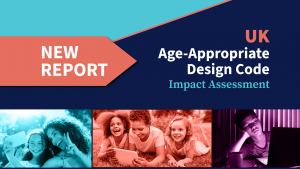On May 17, 2024, Children and Screens joined other organizations and individuals in a letter to the House Energy and Commerce Committee in support of the Platform Accountability and Transparency Act (PATA). The letter highlights key provisions to “ensure accountability, oversight, and compliance” from big tech companies–particularly as a means to support other reform efforts connected to kid’s safety and comprehensive privacy.
May 17, 2024
Honorable Cathy McMorris Rodgers
Chair
House Energy and Commerce Committee
2125 Rayburn House Office Building
Washington, DC 20515-4705
Honorable Frank Pallone
Ranking Member
House Energy and Commerce Committee
2322A Rayburn House Office Building
Washington, DC 20515-3006
Honorable Gus Bilirakis
Chairman Innovation, Data, and Commerce
House Energy and Commerce Committee
2306 Rayburn HOB
Washington, DC 20515
Honorable Jan Schakowsky
Ranking Member Innovation, Data, and Commerce
House Energy and Commerce Committee
2408 Rayburn HOB
Washington, DC 20515
The undersigned organizations and experts are writing to express our strong support for provisions that would ensure oversight and accountability of the tech sector, including platform transparency and researcher access. As you look to protect minors and safeguard Americans’ data privacy online, we urge you to include the strongest possible transparency provisions, which are crucial to ensuring compliance with federal statutes and creating safer, healthier online spaces.
With key bills gaining momentum right now, Congress has a chance to do what many thought would never be possible and what tech companies have fought against for nearly two decades — dramatically tilt the balance of power on the internet towards consumers by requiring the largest online providers to prioritize the privacy and safety of their users. The attention of both parties and both chambers to these important proposals deserves to be celebrated.
However, meaningful transparency is a key pillar of tech accountability. Without any legislative or regulatory mandate to do so, the largest tech companies have chosen to reveal little about how their platforms work. Through the persistent work of researchers and Congressional offices, as well the bravery of whistleblowers, we have learned key information about how tech companies scrape and monetize our data, hook the attention of our children, and divide our communities with the most inflammatory content. But too often, efforts to uncover the truth are blocked by the companies or silenced by the threat of lawsuits.
This year, both TikTok and Meta restricted tools used by independent researchers and academics. The U.S. needs a consistent, meaningful transparency framework to truly unlock the black box, empower policymakers, and enforce other reform efforts like kids’ safety and comprehensive privacy. Right now, we’re heading in the opposite direction.
Bipartisan, effective provisions to ensure accountability, oversight, and compliance include:
● Advancing our understanding of the societal and mental health impacts of social media by requiring large platforms to provide qualified, independent, and approved researchers with access to certain platform data;
● Requiring online platforms to conduct and publish risk assessments focused on the online safety of minors and data privacy, including detailing their risk mitigation efforts. Using third-party, independent auditors to confirm these risk mitigation practices annually (similar to construction-industry safety audits).
● Assuring user privacy and protecting proprietary corporate information through strict privacy and cybersecurity requirements; and
● Preventing retaliation against researchers and companies by shielding individuals, organizations, and platforms that adhere to privacy and cybersecurity safeguards from legal liability.
● Requiring online platforms to develop comprehensive “ad libraries.” These libraries should include the content of all advertisements on the platform, who paid for each advertisement, the period during which an advertisement was presented, the total number of recipients reached, and information about the extent to which an advertisement was recommended, amplified, or restricted. Meta has long maintained an ad library, but has restricted researcher access to it.
These provisions are crucial for holding social media companies accountable for how their design choices and business models impact our kids, our communities, and our democracy. The disclosures enabled by this framework would provide policymakers with high-quality, independently verified information vital to crafting effective solutions and ensure compliance with other tech reform priorities.
As you continue to craft important bills to reign in the practices of Big Tech companies, we, the undersigned organizations and experts, strongly urge you to remember and incorporate the strongest transparency provisions possible. Thank you for your attention to these critical issues.
Sincerely,
American Psychological Association
Anti-Defamation League
Brightlines
Center for Countering Digital Hate
Children and Screens: Institute of Digital Media and Child Development Child Mind Institute
Coalition for Independent Technology Research, Board of Directors CrowdTangle
Institute for Strategic Dialogue
Issue One
National Conference on Citizenship
Baobao Zhang, Syracuse University*
Cameron Hickey, National Conference on Citizenship
Connie Moon Sehat, Analysis and Response Toolkit for Trust Dean Jackson, Public Circle, LLC
Dimitri Christakis, University of Washington
Dr. Emma L. Briant, Monash University
Francesco Andrea Causio, Società Italiana Intelligenza Artificiale in Medicina Ilan Strauss, University College London
Jonathan Haidt, New York University
Peter Gerhardstein, Binghamton University-SUNY
Renee DiResta, Stanford Internet Observatory
Dr. Toussaint Nothias, New York University
Yael Eisenstat, Cybersecurity for Democracy
*Affiliations listed for identification purposes only

